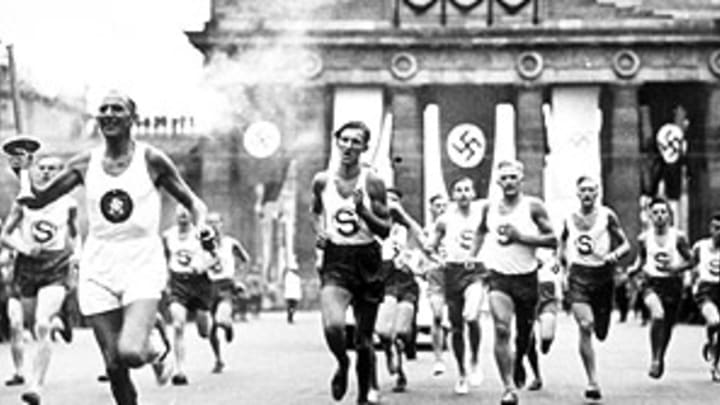At the 1936 Olympics 75 years ago, the Games were changed forever


While, of course, nothing can approach the horror of the terrorist murders at the 1972 Olympics, it is now the 75th anniversary of what were surely the most fascinating and historically influential Games---- those in Berlin that began this very week in the summer of '36. It was novelty and glory and evil all in athletic conjunction as never before or since.
Everything was out of joint. The U.S. team left a continent, here, that, much like this summer, was steaming in as torrid a heat wave as we'd ever known, and arrived in Berlin in weather so unnaturally cool the Germans called it "April in August." But then, even before the Opening Ceremonies, there was controversy, as America's premier female athlete, the beautiful swimmer Eleanor Holm, was summarily thrown off the team, allegedly for misbehaving on the ship over.
The '36 Games themselves are primarily infamous, of course, for Adolf Hitler refusing to congratulate Jesse Owens, who was the best of our African-American track and field contingent, which was dismissed by many Europeans---- and not just Nazis---- as our "Ethiopian ...: or "black auxiliary." Worse, near the end of the track competition, two Jewish-American sprinters, Marty Glickman and Sam Stoller, were kept out of the relay finals by our own team's decision, so that our anti-Semitic hosts would not be upset.
But notwithstanding, there was no great hue and cry. Jesse Owens, remember, had trouble finding a good job back home. Rather, the '36 Olympics were celebrated, worldwide, as a German triumph. Hitler, who had no interest in sports, originally had to be convinced not to give them up, but then the Nazis dolled up Berlin, tucking away much of the visible signs of hate, and made far more of a glorious spectacle of the Games than had ever been seen before. The torch relay, for best example, was no ancient Greek rite; the Nazis dreamed that up out of whole cloth.
The German team won the most medals. Visitors were charmed by Berlin and the Nazi achievements. The general consensus was: well, those fellows can't be all that bad. And the closing ceremony---- the last memory sports fans took away---- was the culmination of the ripest Nazi symbolism ... like some great pagan festival, flags and sabers, Beethoven, searchlights playing across the heavens, fifty-two tall blondes dressed all in white, for the fifty-two nations participating, marching like vestal virgins. And then, at last, the '36 Olympics closed, the stadium silent until, spontaneously, the hundred thousand people began to chant, "Sieg, heil, sieg heil," their right arms outstretched. It was, from all accounts, mesmerizing. The '36 Olympics had done their job. After that, it was the deluge.
And after that, too, the Games would never be the same. Like it or not, it was the Nazis, seventy-five years ago this summer, who bequeathed the glitzy modern Olympics to the world.
